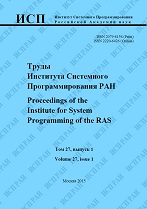|
This article is cited in 1 scientific paper (total in 1 paper)
Tool for behavioral analysis of well-structured transition systems
L. W. Dworzanski, V. E. Mikhaylov
Department of Software Engineering, National Research University Higher School of Economics
Abstract:
Well-structured transition systems (WSTS) became a well-known tool in the study of concurrency systems for proving decidability of properties based on coverability and boundedness. Each year brings new formalisms proven to be WSTS systems. Despite the large body of theoretical work on the WSTS theory, there has been a notable gap of empirical research of well-structured transition systems. In this paper, the tool for behavioural analysis of such systems is presented. We suggest the extension of SETL language to describe WSTS systems (WSTSL). It makes the description of new formalisms very close to the formal definition. Therefore, it is easy to introduce and modify new formalisms as well as conduct analysis of the behavioural properties without much programming efforts. It is highly convenient when a new formalism is still under active development. Two most studied algorithms for analysis of well-structured transition systems behavior (backward reachability and the Finite Reachability Tree analyses) have been implemented; and, their performance was measured through the runs on such models as Petri Nets and Lossy Channel Systems. The developed tool can be useful for incorporating and testing analysis methods to formalisms that occur to be well-structuredness transition systems.
Keywords:
formal verification, infinite systems, well structured transition systems, Petri nets.
Citation:
L. W. Dworzanski, V. E. Mikhaylov, “Tool for behavioral analysis of well-structured transition systems”, Proceedings of ISP RAS, 29:4 (2017), 175–190
Linking options:
https://www.mathnet.ru/eng/tisp242 https://www.mathnet.ru/eng/tisp/v29/i4/p175
|

| Statistics & downloads: |
| Abstract page: | 144 | | Full-text PDF : | 76 | | References: | 31 |
|




 Contact us:
Contact us: Terms of Use
Terms of Use
 Registration to the website
Registration to the website Logotypes
Logotypes









 Citation in format
Citation in format 
